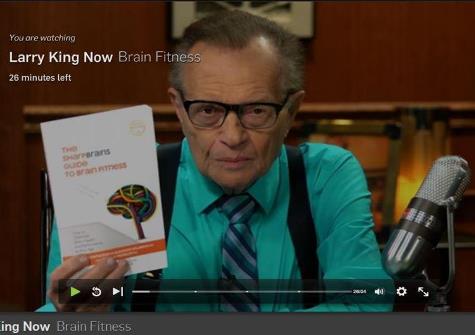Without Brain Health, you do not have Health
 As you go through life, your brain undergoes extraordinary development. Your brain is the most adaptable, modifiable organ in your body, and it can change both positively and negatively by how you use it each day. Just by reading a book such as this one, your brain has been changed.
As you go through life, your brain undergoes extraordinary development. Your brain is the most adaptable, modifiable organ in your body, and it can change both positively and negatively by how you use it each day. Just by reading a book such as this one, your brain has been changed.
How has your brain been altered throughout your life? How may it change in years and decades ahead? The good news is that much of the age-related decline is likely avoidable and even reversible. The fact that you bought and have read this book to the very end tells me you are motivated to do something about your brain performance. Our cognitive brain health tends to decline over time because we let it, but you can be your own brain health fitness coach to maximize brain function. Growing brain research shows that a majority of individuals can make their brain smarter every single day.

Dr. Sandra Bond Chapman
When I first met Álvaro Fernández Ibáñez after having spoken at the impressive 2012 SharpBrains Virtual Summit, our brains connected as we shared our thoughts on what major gaps needed to be filled to achieve greater brain gains for individual and global brain health. As a cognitive brain scientist, my life has been dedicated to discovering ways to optimize brain health and applying rapidly emerging innovations to make a difference in people’s lives. Álvaro and I come together from disparate disciplines, but we both see brain performance as the most vital and urgent frontier to build a healthier, more economically productive society.
It typically takes twenty to forty years or more for scientific discoveries to meaningfully benefit human life. We cannot wait that long. It would be too late for the majority of people today. None of us can afford to let our brains decline – not even for a day. You would not accept that for your heart, eyes, or lungs, so why allow such slippage for your most valued asset?
Increasing research and scientific discoveries from my research center, the Center for BrainHealth at The University of Texas at Dallas, and others have shown that everyone can increase their intellectual capital, maximize their cognitive potential, and harness the immense capacity of their brain to rewire itself in health, and even after brain injury or brain disease.
How can we extend the brain span to more closely match the extensive gains in the human lifespan?
As I offer reflections on the brain health advice and scientific evidence unfolded throughout this book, I hope you begin to think differently about your brain and actively embrace the exciting and promising reality that your brain’s health is the cause of the century.
I challenge you to:
• Update any outdated beliefs about the brain.
• Sort out and stop habits that are impairing your brain performance.
• Spend time on meaningful real-life activities that demand vital decision-making and complex problem solving.
• Begin today preparing a plan for next week. What is one tangible step you are willing to take to better your brain health?
• Become a vocal ambassador of brain health to all those around you — whether at work, home, community or play.
You have taken an important first step to becoming an active member of the Brain Fitness Movement by reading this book. You are never too young or too old to commit to adopting beneficial brain health habits that challenge and enhance your brain’s capacity to think and act smarter. And keep in mind that…
Your health starts and ends with your brain’s health.
Your brain is the most vital organ and supports everyday things you do, including your ability to think, learn, reason, create, problem solve, imagine, decide, or plan. You should start and end every day thinking about how well you have tended to the health of your brain, whatever life stage you are in. It is just as essential to measure, monitor and maximize your brain fitness as it is to measure, monitor and maximize your physical fitness. In fact, more can be done to keep your brain healthy than any other part of your body.
As a start to your new commitment to brain health, take seriously the recommendations and ideas generated from reading The SharpBrains Guide to Brain Fitness. I invite you to impact, imagine, innovate, and inspire.
- Impact. We always want something easy to do, like a certain number of puzzles to complete each day or a magic pill to take, to make us think smarter and keep our brain healthy. But simplistic formulas do not have a substantial and lasting impact on such a complex organ as our brain.
- Imagine. We know more about the universe than we do about the human brain, but brain science is a fast growing field of exploration. Scientific research shows every individual builds a unique brain by how they use their brain every day. You control your brain’s destiny. Imagine the limitless possibilities.
- Innovate. Today, scientists and innovators worldwide are taking advantage of innovative and sophisticated technological advances to document and measure dramatic, rapid rewiring at all levels of the brain – from brain blood flow, to synapses, and even to entire brain networks. Design and innovate your own brain workouts to take advantage of all these brain gains.
- Inspire. Inspire others around you to adopt brain habits and encourage them to become involved in complex cognitive activities. Become a role model and show how to reduce high levels of stress, engage in proper nutrition, and retain rich social engagements.
In the past ten years brain scientists have discovered much more about how the brain works, how to improve brain health and performance over time, and how doing so contributes to overall health and well-being. Join us in making sure your best brain years are ahead of you.
 Without brain health, you do not have health.
Without brain health, you do not have health.
– Sandra Bond Chapman, PhD is the Founder and Chief Director of the Center for BrainHealth and Dee Wyly Distinguished University Professor at The University of Texas at Dallas. This is an adapted excerpt from her Afterword in The SharpBrains Guide to Brain Fitness: How to Optimize Brain Health and Performance at Any Age, the book recognized as a Best Book by AARP and kindly featured by the late Larry King. Please remember to mark your calendar for BrainHealth Week (February 20–24th) and join the multiple educational initiatives!



Hello,
This is a very positive article about the possibilities of improved brain health. And I think, with Bond Chapman, that it certainly gives us all hope for the future.
And I can also understand Bond Chapman’s enthusiasm for the subject, considering her long career in the field of brain health, etc. But I just think some of her statements are too bold (“more can be done to keep your brain healthy than any other part of your body”, etc.).
For brain health is, of course, not the only factor when it comes to the overall health of the organism, whether it be a human being or animal. There are many factors that also contribute to a robust overall health, not the least the health of the billions of organisms (bacteria, viruses, fungi, etc.) in our digestive tract that do not have our DNA. In fact, we are more microbes than humans, since human cells only make up 43% of the whole cell count of our bodies (“More than half your body is not human”, BBC News, 10 April 2018).
So although brain health indeed is important, it is not the only game in town, in terms of physical health.
Note also that I am not opposed to training our minds, at all. But I think it matters what our objective is: Is the objective merely to be “competitive” in this world, and, with Bond Chapman, put one’s focus on “performance” and “decision-making” and “complex problem-solving” and “make their brain smarter” and end up with a “more economically productive society”?
Or is the objective to be happier, more relaxed, and more “in tune” with yourself, and thereby becoming more creative and successful as a result, without worrying so much about “flexing” or “optimizing” our brain muscles? As for myself, I think the latter motivation is the only interesting one. And it involves serious brain/mind training, as well.
Thanks for an interesting read!
Chris Bocay